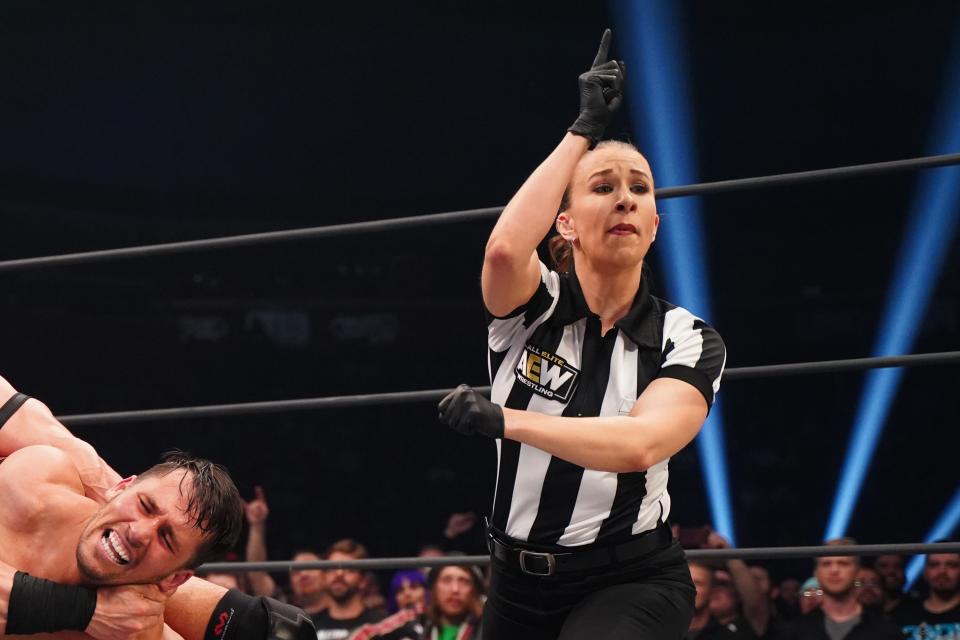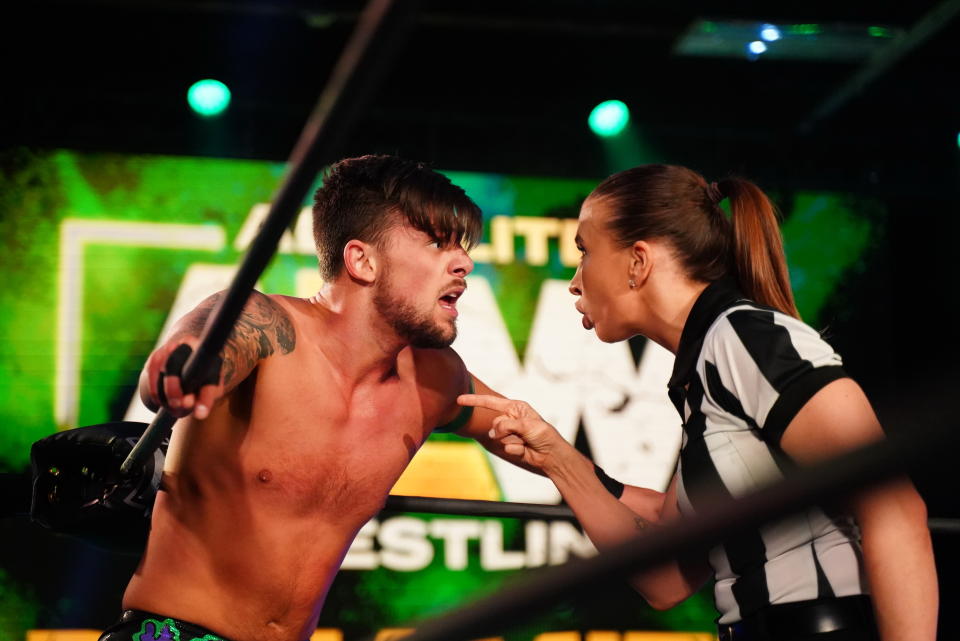AEW's Aubrey Edwards is the trailblazing referee you don't want to mess with

In many ways, Aubrey Edwards is an outlier. Although she spent the majority of her life oblivious to the industry that would eventually become her career, the 33-year-old Seattle, Washington, native stands out as one of the more recognizable figures in professional wrestling.
“My journey to wrestling is an interesting one because most people grew up watching wrestling as kids,” Edwards told Yahoo Sports. “That’s not something I ever did, I played a lot of video games instead.”
While Edwards admits her path into professional wrestling was anything but orthodox, there’s one consistent element in everything she has done in her life thus far. Dating back to her time performing as a classically trained ballet dancer to her work as a producer in the video game industry, storytelling has always been the draw for Edwards.
It may have taken more than two decades, but Edwards eventually discovered there was a lot to like creatively from the world of sports entertainment.
“I was watching WrestleMania with friends who did watch it growing up,” Edwards said. “I was kind of going along with the ride, we were having a party. It wasn’t until a couple of months later when WWE had the moment historically known as the ‘Pipe Bomb’ where [CM Punk] cut a promo and it made me question how much of it was real and how much of it was scripted. That was the moment where I learned that wrestling is just another form of storytelling.”
‘It snowballed very quickly’
After that moment, Edwards dove head-first into the industry. Traveling to shows, supporting her local independent promotion, watching as her husband trained, Edwards did everything she could to immerse herself in professional wrestling, but there was never an intention of becoming involved herself.
Even when she did make the decision to explore a path into the industry, Edwards once again proved she was an anomaly. Yes, she wanted to perform, but in a much different role than many who step into the ring.
“I never actually had any intention of joining the business and eventually when I did I never had any intention of being an actual wrestler,” Edwards said. “The referees at my local promotion said they were running a class and they said they felt like I would be a good fit. It didn’t make sense at the time, but now it does. I went, tried out, it was terrible and I sucked, but gave me an appreciation for what the referee does in a match. That was May of 2017, so after a few months of training and having a better understanding of what my role was on the show, I reffed my first wrestling match in July of that year and the rest is history. It snowballed very quickly.”
Fast-forward three years and Edwards is the top official for All Elite Wrestling, the primary competitor for WWE. Although AEW has existed for less than two years, the fledgling promotion features many of the industry’s top stars and has sparked plenty of enthusiasm from fans. While it’s quite normal for wrestlers like Chris Jericho and Cody Rhodes to experience the bright lights and adulation from fans, it’s rare for a referee to rise to the level of celebrity Edwards has in such a short period of time.
“It’s wild to me, I still kind of don’t believe it,” Edwards said. “My biggest struggle with all of it is that it’s been really great to get the recognition from fans and my colleagues but the thing I try to be the most careful about is that, at the end of day, it’s not about me. My job as a referee is always to help other people tell stories. I’m appreciative and cannot deny that it is there, but it’s not about me and it’s never going to be about me. It’s always about all of us as a team.”
Edwards’s rise to stardom in AEW can be traced back to August 2019. After working the first three shows for Tony Khan’s promotion, Edwards was put in a position to work the main-event match of “All Out,” a pivotal moment for AEW and one where Jericho — a 30-year veteran — would help establish her as a force and character in the ring.
“Jericho played a big part in it,” Edwards said. “He’s said publicly that he picked me for the AEW championship match because he wanted the big-match feel. I’m not a referee in the same way that I would be if it were another sport. I’m an actor portraying a referee. Somehow, Jericho saw that. The moment at ‘All Out’ was something that he gave me in saying ‘I really want to put you over as the authority and you’re not going to take any crap from me.’ Part of that also helps make him a bigger heel, because he’s trying to push me around.”

The no-nonsense approach has become a staple of Edwards’s on-screen character and it’s part of the overall role she plays every time she steps into the ring. While fans’ primary focus will always be on the athletes performing in the ring, there are myriad tasks that Edwards and other officials need to carry out to make sure the show goes off without a hitch.
“My job first and foremost, is to make sure that everyone is safe,” Edwards said. “Unfortunately, as much as we do pre-planned stuff, accidents happen. I’m essentially the first line of defense if something goes wrong. I’m communicating with the wrestlers, assessing the situation, communicating to the people in the back.
“One of my coaches early on described it as me being an interpreter for the audience. A lot of times the audience may not realize that they are watching me. You’re watching the action but you’re sort of feeling what I’m feeling at the same time. If you go to a wrestling show for the first time and you don’t know the rules, you’re watching the referee to understand the rules. Even though this is choreographed, without a referee, it’s just two people rolling around in a ring. The referee gives it structure, the referee gives a goal for what they are doing in the ring.”
There’s also a very physical aspect when it comes to refereeing in professional wrestling. Most of the spotlight — deservedly so — goes to the athletes performing in the ring, but to ignore the amount of training that goes into what Edwards does on a weekly basis would be severely underestimating one of the most demanding aspects of the job.
“I was really fortunate to have formal referee training, which is really, really rare in wrestling,” Edwards said. “I have a lot of appreciation for everything the wrestlers do, but what they do in a match and what I do in a match are very different. When I start a match, I’m standing stationary and moving slowly with the wrestlers, but as the match goes on the intensity increases and all of my stuff is reactionary. If they move to one side, I have to adjust accordingly. A lot of the cardio is very explosive, so I do high interval intensity training. If I’m going to do cardio, running a mile or moving at the same speed for 60 minutes doesn’t help me. I’m moving slow then moving fast.”
Aubrey Edwards, the trailblazer and ultimate helper
At its most visible level, the professional wrestling industry has undergone significant changes over the better part of the past decade. As women rose to more prominent roles both in the ring and behind the scenes, it has been rare to see female referees working at the highest levels. In that sense, Edwards has been somewhat of a trailblazer. Shortly after Edwards’s rise to prominence in AEW, Jessika Carr became the first full-time female official for WWE’s ‘Smackdown.’
Edwards doesn’t shy away from the idea that she’s helped break down barriers, but she also hopes that her gender won’t define her ability to do her job.
“It’s been an interesting challenge [to balance that],” Edwards said. “Coming up from the independents, I was really fortunate that Seattle is a very progressive area and a lot of the places that I worked didn’t see me as anything different. I was treated the same as any official, man, woman or anything in between, it doesn’t matter, you’re there to do the job, play the role and get paid.
“From the trailblazing perspective, it’s interesting because I have had a lot of parents reach out to me who see a strong, authoritative woman on TV. That’s probably the thing that has made me the most proud of my body of work so far in AEW. There’s a lot of talk about representation mattering in media and I get to live that role. I’m a woman in male-dominated role so I am able to stand out without really standing out as well. I wear the same stripes, black slacks and black shoes as everyone else, but my stuff is a little more feminine-cut, I do my makeup, I do my nails for every show. There’s just the little things that keep me different without drawing too much attention that I am a woman.”
Being a woman in a male-dominated industry isn’t the only way Edwards stands out. In a series of tweets earlier this year, Edwards opened up and revealed that she is bipolar. Edwards described the struggles she has faced since being diagnosed eight years ago and offered insight into how she copes with the disorder.
The decision to let the public in on a very private aspect of her life was a testament to how she could continue to use her newfound fame to help others.
“I was sitting in the airport, it was like 3 a.m., and I thought it would be an appropriate time to talk about it,” Edwards said. “It kind of dawned on me that I have this platform that I built, why would I not use the opportunity to speak about something this serious? AEW has been so supportive. I know not everyone has that, so seeing people have a really awesome position in the world and seeing that things aren’t perfect, that we all have struggles, I just hoped that it was going to help somebody.”
My Twitter is often filled with silly posts about food and animals but I want to get serious for a minute. Today we're talking about mental health awareness and Bell will donate 5 cents for each use of the #BellLetsTalk hashtag
This is going to be difficult. Stay with me.
(1/5)— Aubrey Edwards 💗💜💙 (@RefAubrey) January 29, 2020
Helping people is something that seemingly comes naturally to Edwards. On top of all of her refereeing duties, Edwards serves as a project coordinator for AEW. A role she describes as “catch-all,” Edwards co-hosts and helps run a podcast with Tony Schiavone, helps coordinate equipment tracking, social media and is involved in the “early, early” development of the AEW video game.
“At the end of the day, this is the happiest I have ever been and I want this job to last as long as it possibly can,” Edwards said. “Anything I can do to help this company be successful I want to do it.”
It appears that the biggest thing Edwards can do to help AEW be successful is continue to unapologetically be herself.
More on Yahoo Sports:

